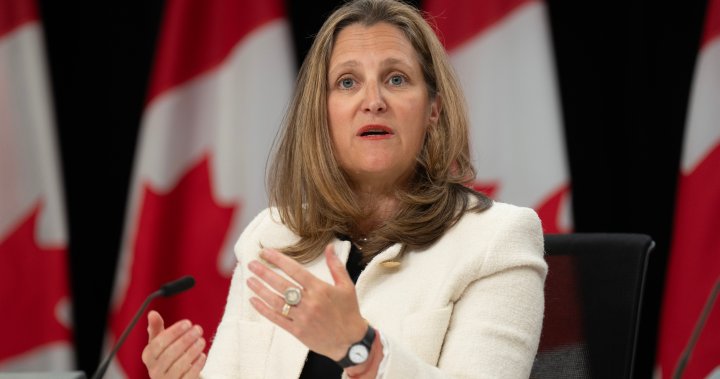The Finance Minister Chrystia Freeland is expected to announce a plan for potential tariffs to protect Canada’s electric vehicle supply chain from unfair Chinese competition. This move comes after both the United States and Europe imposed tariffs on Chinese-made EVs this spring. Before Canada can impose new tariffs, an anti-subsidy investigation must be completed by the Canadian International Trade Tribunal. China is a major player in the battery and battery components industry for EVs, with almost 80 per cent of all lithium-ion batteries for electric vehicles globally coming out of China in 2021.
Accusations of unfair subsidies from China towards its EV industry led to both Europe and the U.S. retaliating this spring. U.S. President Joe Biden announced a hike in tariffs on Chinese EVs from 25 per cent to 100 per cent this year. The European Commission is completing its anti-subsidy investigation and plans to impose provisional tariffs on Chinese-made EVs. Chinese-branded EVs make up eight per cent of the European market, compared to one per cent in 2019, with many Chinese EVs being substantially cheaper than European models.
The decision on tariffs in Canada will depend on the consultation process. Prime Minister Justin Trudeau has stated that Canada is closely monitoring the situation and deciding on its course of action. International Trade Minister Mary Ng has been working on a plan for Canada since the European Commission announced its provisional tariffs. Canada has attracted significant investments in electric vehicle manufacturing projects since 2020, with the government promising financial support and incentives to the industry.
The process of launching an anti-subsidy investigation usually starts with a complaint from the industry. Canada has heavily invested in the electric vehicle supply chain over the last four years, with over $46 billion in investments for manufacturing projects. Ottawa and the provinces have pledged up to $53 billion in support, including tax credits, production subsidies, and capital investments. It is important for Canada to protect its electric vehicle supply chain from unfair competition and ensure the industry’s growth and competitiveness in the global market.
The joint announcement by Finance Minister Chrystia Freeland and International Trade Minister Mary Ng signals Canada’s commitment to addressing the issue of unfair competition in the EV supply chain. The consultation process and anti-subsidy investigation will play a crucial role in determining the appropriate tariffs to protect Canada’s interests. With China being a dominant player in the battery and battery components industry for EVs, it is important for Canada to take action to safeguard its market and support the growth of its own electric vehicle manufacturing industry. The decisions made by the U.S. and Europe serve as examples for Canada to consider in its approach to addressing unfair subsidies in the EV market.


